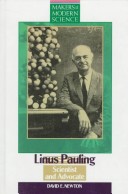Makers of Modern Science S.
1 total work
The biography series, aimed at young adults, profiles important modern-era scientists. The volumes focus on the lives of those men and women who, in the 19th and 20th centuries, made the greatest contributions to scientific knowledge. Each book looks at a scientist - or group of scientists - whose work had a major impact on a particular field. In simple prose, free of technical jargon, each scientist's achievements are discussed, including the scientific principles underlying his or her work. The human drama of scientific work, conveying the excitement and frustration of research, as well as the exhilaration and rewards of discovery, are also depicted. This particular volume focuses on the life and career of Linus Pauling, the first person to be awarded two unshared Nobel prizes. He combined the use of chemistry and physics in solving various puzzles relating to the nature of chemical bonds and developed unique model-building techniques that he put to use in his studies of proteins, amino-acids and DNA. In 1954 he won the Nobel Prize for Chemistry for his work on protein structure.
As a result of his research, Pauling became concerned about the potential role of radioactive fallout in hereditary diseases. He became a fierce opponent of nuclear testing, gathering the support and signatures of 11,000 scientists worldwide with which he petitioned the United Nations. He won the 1962 Nobel Peace Prize for his efforts.
As a result of his research, Pauling became concerned about the potential role of radioactive fallout in hereditary diseases. He became a fierce opponent of nuclear testing, gathering the support and signatures of 11,000 scientists worldwide with which he petitioned the United Nations. He won the 1962 Nobel Peace Prize for his efforts.
